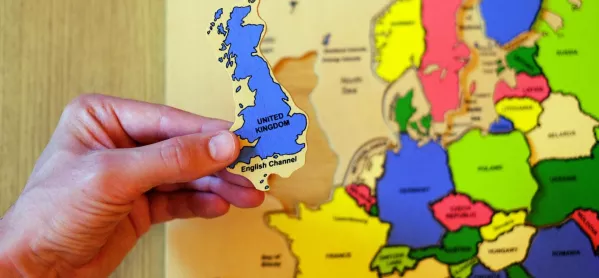Brexit is being blamed for the number of teachers from the European Union opting to come and work in Scotland “falling off a cliff”.
In the first half of this year just 14 teachers from the EU applied to regulator, the General Teaching Council for Scotland (GTCS), so they could teach in Scottish schools, according to official figures. However, in recent times the number of EU teachers applying to work in Scotland has been rising from 128 in 2015 to 186 last year.
GTCS chief executive Ken Muir told Scottish political magazine, Holyrood, which uncovered the figures, Brexit was a leading factor in the drop and that it was also turning off overseas teachers from outside the EU - although he said Britain’s immigration policy had a role to play.
The overall figures for overseas teachers are also down this year, with 614 registrants from outside Scotland in 2016, 598 in 2017 but only 126 in the first half of 2018.
Tes is currently campaigning for visa rules for international teachers to be relaxed and for the whole profession to be added to the ‘shortage occupation’ list which would make it easier for overseas teachers to secure visas.
Currently only teachers in four subjects - maths, physics, computer science and Mandarin - are on the list.
Earlier this month Tes Scotland reported on a primary teacher from the US and a teacher of English from Canada, who had trained in Scotland and were keen to work here, but were being forced to leave.
Mr Muir told Holyrood: “Having maintained numbers pretty high from the EU, they are falling off a cliff, and that’s absolutely down to Brexit.”
The drop in teaching has been later and more sudden than in other sectors, which have seen a decline since Theresa May triggered Article 50 to formally leave the European Union.
Mr Muir continued: “Whereas in the health and care industries two years ago the numbers it more or less started to dwindle, the teacher numbers kept up.
“Particularly from three countries in the EU, Greece, Poland and Spain, we get a good number of applicants, followed by the Republic of Ireland it has to be said - those four are our big hitters, and those numbers have dwindled to next to nothing.”
Mr Muir said that Britain’s immigration policy may have been a factor in the drop in applications from overseas, but Brexit was compounding the problem.
Mr Muir continued: “It’s always been the case that immigration rules, tier two status and all the rest of it have had a role to play in that, but I think that, together with Brexit, means folk are asking ‘is it really worthwhile to come and teach in Scotland?’”
He added: “It compounds the problem we’ve got bringing teachers into the education system in Scotland.”
Please support our campaign and sign the Let Them Teach petition. If the petition hits 10,000 signatures the government is obliged to formally respond to it. If it hits 100,000 signatures it will be considered for a debate in Parliament. To sign it, click here.
Find out more about Tes’ campaign by visiting the Let Them Teach homepage.




